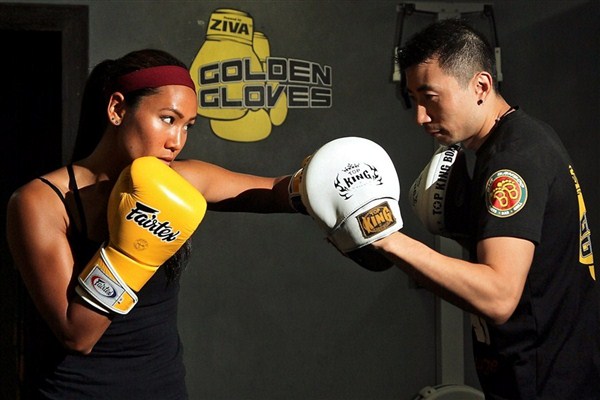
今日上海
外籍白领的拳击之路 - 2014年08月18日
Office workers and boxing prove winning combination after hours

ANANDA Martin arrives at the gym in a bit of a frenzy. Some last minute work at the office has made her 10 minutes late for her Friday evening boxing class. She hurriedly changes into her sports gear, wraps her hands and wrists with protective bandages and rushes out to joint fellow classmates in the ring.
Martin, 41, works for a law firm. Her job, though stressful, requires a cool head and genteel manner. No wonder she unleashes so much pent-up emotion at the punch bag. The white-collar worker becomes an action woman worthy of a kung fu film.
“Eighty percent of boxing is about mental strength, and the rest is physical ability,” Martin told Shanghai Daily.
Despite her busy schedule, Martin tries to spare five nights a week for boxing classes in a local club. In addition to the workout, the diversion gives her the opportunity to meet people outside legal circles.
Gymnasiums are part of the lifestyle of many white-collar workers nowadays, and boxing is becoming an increasingly popular form of after-hours recreation. It not only helps practitioners stay fit and develop muscle tone, but it also provides a satisfying outlet to let off steam and build self-confidence.
Shanghai, in fact, was the cradle of China boxing. The sport was first introduced in the 1930s and 40s. A death in the ring in 1958 resulted in the sport being banned nationwide. It wasn’t until 1986 that professional boxing was once again allowed in China.
“We have people from all walks of life,” said Xiong Xin, a veteran coach at the Golden Gloves Gym in Zhabei District. “Although most are expats, our Chinese membership has been increasing. And more than 30 percent members are women.”
Alina Negley is another woman in the Friday evening class. Despite gloomy weather, she, Martin and seven other members showed up for the session. Under the direction of Xiong, they spent half an hour on stretching exercises like deep squats, plus some sprinting. Then they paired off for footwork and sandbag training.
Negley, a 25-year-old Japanese-American, is a sports coach and, not surprisingly, one of the most active members in the class.
“I need something to relieve stress,” she said. “When I have a bad day, I come to the gym, and after a workout, I feel refreshed. A lot of girls say boxing is violent. But during practice, you don’t get hit in the face. I suppose that’s the biggest fear for women.”
After 18 months of practice, Negley has developed her own approach to boxing.
“The first thing about boxing is to pay attention to your footwork and to your opponent,” she said. “After that, you can create your own moves, patterns and pace. Learning to breathe deeply and properly as you punch is also important.”
The club also provides women only sessions. “Ladies have privilege here,” coach Xiong joked.
Mistaken impression
His father, Xiong Wei, was a former middleweight national champion. The young Xiong tried to follow in his father’s footsteps, training with the Chinese national team when he was younger. He became a boxing instructor in 2002.
“Some people might get the mistaken impression that boxing is a violent sport after watching professional fights on TV,” Xiong said. “In fact, boxing is more about self-control, especially in amateur boxing. The goal is not always to knock the opponent down. It’s a competition to see who will collect the most points.”
Chinese people are beginning to take boxing more seriously as a recreational sport, he said. Some come out of curiosity. Some come because they think it will impress their friends. Some come because they want to improve their bodies. Some are intrigued after seeing amateur boxing in the Olympics and other events.
“Compared with expats, about 80 percent of my Chinese students don’t regard it as a sporting part of their lives, but it’s never too late for them to become initiated,” said Xiong, adding that his oldest student is a 60-year-old from Hong Kong.
Build self-confidence
His lessons come with tips on diet and healthy living.
“Six years ago, when I first started boxing, my family and friends all warned me that it was a violent sport,” said Zhang Ruofan, who works in a local consultancy company.
Zhang said he usually uses his lunch break to come to the gym for training. His wife has also become a member. Boxing, he said, has helped him build self-confidence and a better attitude toward tackling problems.
“When I come into conflict with others, I used to lose temper easily,” Zhang said. “Now I realize the best solution is not always fighting. I learned that from boxing, where you need to keep cool and relaxed.”
Xiong said boxing can help channel basic human instincts that get bottled up in modern life.
“It’s natural for a human to fight against a fierce environment or a threatening enemy,” he said. “Sometimes we need to find a creative outlet for those instincts. We have strength, but our strength should not be used indiscriminately to hurt people. Boxing makes us stronger and also teaches us how to channel our strength.”

